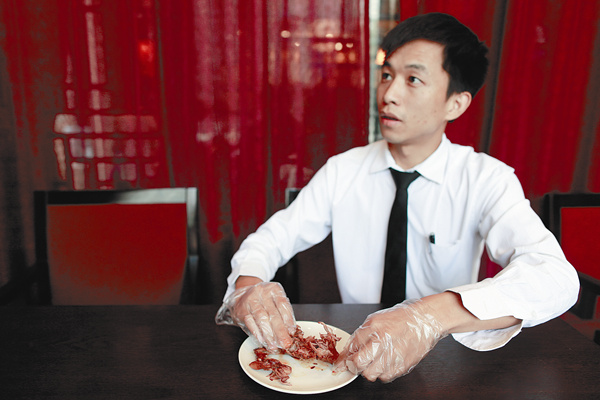Daredevil diners hop along to rabbit restaurants
 |
|
As Chinese people become increasingly affluent, the habit of eating rabbit heads, which seems unpalatable to squeamish Westerners, is not fading, but growing. [Photo by Feng Yongbing/China Daily] |
A regional delicacy is all the rage, but it's definitely not for the faint hearted.
Rabbits: cute, cuddly ... tasty.
Braised rabbit heads, traditionally sold as snacks by street vendors in Sichuan province, are now regarded as delicacies by adventurous, wealthy diners at a number of prestigious Beijing restaurants.
In the Sichuan dialect, the phrase for eating rabbit heads is ken tu tou, but the act of doing so - turning your head, sucking the succulent meat, and the craving that accompanies it - gives the term a different meaning: "To kiss".
On Monday in Beijing's Shuangliu Grandma's Rabbit Head, a well-known restaurant devoted to exotic dishes, young ladies in snappy dress, carefully protected by plastic gloves and aprons, were "kissing" rabbit heads. Every evening, usually after 7 pm, at least 30 enthusiastic bunny eaters sit in the restaurant's lounge waiting to be called to their tables.
As Chinese people become increasingly affluent, the habit of eating rabbit heads, which may seem unpalatable to squeamish Westerners, is not fading, but growing.
Demand outstrips supply
China consumed about 500 million rabbit heads in 2013, with people from Sichuan being the largest consumer group, accounting for 200 to 300 million of them, according to Luo Dong, president of the Chinese Rabbit Industry Association.
In 2013, domestic production of rabbit meat was 660,000 metric tons, a year-on-year increase of 10 percent. But domestic supply falls short of demand. "About 100 million rabbit heads - one-fifth of the 500 million - are imported," Lou said, although he stressed that the figure was an estimate.
In July, Germany's Rheinische Post reported that France exported 74 tons of rabbit heads to Hong Kong last year, a huge jump from the 2012 figure of just 4 tons, and the export volume to the Chinese mainland rose from 168,000 euros ($225,243) in 2012 to 443,000 euros in 2013.
















